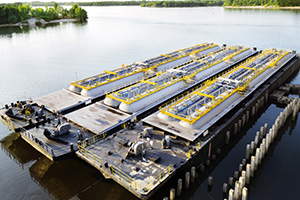Barge Workers Exposure to Benzene Containing Products
0) : ?>
Everyday thousands of tugboat operators and barge workers are exposed to high levels of benzene, refined petroleum products, crude oil, naphtha, gasoline, jet fuel, aviation gas, toluene, xylene and other aromatic hydrocarbons. These toxic exposures can be through the skin (dermal) or by way of breathing the vapors from the bulk product storage or during the loading and off-loading of these petroleum products from the barge to another barge, terminal or to the end user chemical plant or refinery. Sadly exposure to these aromatic hydrocarbons and benzene containing products on these barges can often result in serious life threatening diseases including AML Leukemia, Non-Hodgkin’s Lymphoma, Aplastic Anemia (AA), myelodysplastic syndrome or myelodysplasia (MDS), blood cancers, bladder cancers, Multiple myeloma and other leukemia and cancers.
Benzene Exposures on Barges
Many barge workers, maintenance workers, painters, chippers, welders and tankermen are still unaware of the hidden dangers coming from the often sweet smelling fumes and odors from the products of the barge’s tanks below. While the dangers of pure benzene is well documented, millions of gallons of other benzene containing aromatic hydrocarbons like naphtha, xylene, toluene, gasoline, and jet fuels are moved monthly across the canals, gulf coast, rivers and inland waterways of the United States often without any sort of respiratory protection used by the workers. Besides the exposures while loading or offloading, these barge workers often are required to go into the tanks to inspect them. While these tanks are required to be cleaned and air levels checked before entry, many times high benzene levels can still be exist from the residue still contained in the seams and bottoms of these barge tanks and in the transmission and vent pipes. Further due to the nature of the product, these refined petroleum products release vapors that are routed through pipes out of the tanks, but the exposures to the barge worker are still ever present and endangering to their health. While some barge workers are required to wear self contained respirators many others are never given any type of supplemental air tanks or masks to wear even when benzene levels might be detected if tested. Even today adequate benzene warnings are not posted in all areas of the barges and tugs to assure safety and compliance. As stated above many workers and their employers are lax about benzene warnings as to the lower benzene levels found in other aromatic hydrocarbons.
Barge Workers Leukemia and Cancers for Benzene Exposure
Exposures to benzene and other petroleum products and chemicals can be the silent killer for many tug and barge workers. Months and years of even small vapor exposures can be cumulative on the body resulting in deadly changes in the body. Immediate and low level exposures can leave the worker feeling light headed or dizzy with headaches and confusion and with higher benzene levels the worker can fall into unconsciousness and even death can occur. Because benzene and other hydrocarbons are heavier than air they tend to puddle or gather at the lowest levels, often in the bottom of the tank. When this happens and the worker is not provided safe air, tanks or respirators, then death is a possibly. Long term benzene exposure can result in changes in one’s blood chemistry, decrease in one’s red blood cells and cause an increase in the white blood cell count. It can also result in lowering the immune system and increase one’s chances of infections. Often after many months of not feeling well, gaining or losing weight and these blood levels being off, Doctors often diagnose these maritime workers with leukemia and/or cancers including Acute Myelogenous Leukemia (AML), Myelodysplastic Syndromes (MDS), Non-Hodgkin’s Lymphoma (NHL), Aplastic Anemia (AA), blood cancers, bladder cancers, Multiple myelomas and some kidney cancers.
Benzene Injuries and The Jones Act
When a maritime worker is injured on a boat, barge or vessel, then the injuries to that seaman are covered by the Jones Act. The same is true for a tug or barge worker that is exposed to dangerous toxic chemicals with working on a barge, boat or other vessel. Toxic exposure injury to a maritime or barge worker is treated as an injury, as such the worker is entitled to a daily wage called maintenance and medical benefits called cure. Additionally under the Jones Act, the injured seaman may be entitled to file a negligence lawsuit for other damages against the Jones Act Maritime employer. In cases where the benzene or other dangerous chemical exposures were due to a third party such as a refinery, chemical plant or transportation company or barge owner, the injured maritime worker may bring a claim or lawsuit for damages under General Maritime Laws and even a product liability lawsuit in certain situations.
Talk to a Benzene Lawyer
If you are a loved one has been diagnosed with AML, MDS, NHL, AA or others types of leukemia or cancer and you believe that you were exposed to benzene, toluene, xylene, naphtha or other aromatic hydrocarbons, then call and get a Free Consultation from a lawyer that has represented injured workers across the United States for over 30 years on barges, ships, vessels, chemical plants, power plants and other industries. Call and talk to a Board Certified Personal Injury Lawyer licensed in Texas & New York, but assisting injured workers and families all over the United States. All cases taken on a Contingency Fee Basis – No Attorney Fees or Expenses Charged Unless You Win . Get your Questions Answered Today – Call Toll Free 1-800-883-9858
0) : ?>.jpg)